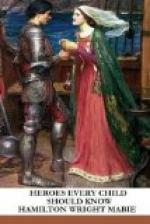“But why go to Altdorf at all, my husband?” said the wife to Tell.
“My business calls me to Altdorf, and I shall go thither like an honest man, in the performance of my duty,” replied Tell. “Thinkest thou that I am either to confess myself a slave, by bending my body to an empty cap, or to permit it to be a scarecrow, that shall fright me from entering the capital city of my native province, lest I should draw upon myself the penalty of refusing to perform a contemptible action, enjoined by a wicked man? No, no, my sweet wife; I shall go to Altdorf, when occasion may require, without considering myself bound to observe Gessler’s foolish edict.”
The return of Lalotte put an end to this discourse; and Annette began to assist her in taking up the supper.
Lalotte was the orphan of Tell’s brother. Her parents had both died when she and her brother Philip were very young, and they had been adopted into the family of her kind uncle soon after his marriage with Annette. Lalotte was affectionate, sprightly, and industrious. She assisted her aunt in the household work and the dairy; and it was her business to take charge of the children, whom she carefully instructed in such things as she knew, and laboured to render them virtuous and obedient.
Philip, her brother, who was about a year older than herself, had been unfortunately a spoiled child. He was self-willed and intractable, and, though far from a bad disposition, was always getting himself and others into scrapes and difficulties.
That night his place at the board was vacant, which his uncle observing, said,
“Lalotte, where is your brother Philip?”
“Absent, uncle, I am sorry to say,” replied Lalotte.
“It is not usual for Philip to desert the supper meal,” observed Tell, “even if he be absent the rest of the day. I am afraid he is after no good.”
A hasty step was heard; and Lalotte exclaimed, “I should not wonder if that were my scrapegrace brother!”
“It does not sound well of you to call him so, Lalotte, though he is a sad plague to us all,” said Tell.
The door was hastily opened, and Philip bounced in out of breath, and covered with mud. He flung himself on a wooden settle beside the fire, and gave way to fits of laughter.
“How now, Philip! what is the cause of all this?” asked Tell gravely.
“Hurrah!” shouted he, springing from his seat, and capering about, “I have done such a deed!”
“Some notable piece of folly, no doubt,” observed his uncle; “what is it, boy?”
“A deed that will render my name famous throughout the whole province of Uri, my good uncle. Everybody is talking about it in Altdorf at this very moment,” exclaimed Philip, rubbing his hands.
“You have long been celebrated there as the ringleader of mischief,” observed Tell; “but I doubt whether you will have much reason to exult in the evil reputation you have acquired, Philip. Therefore go to bed, and when you say your prayers, ask for grace to reform your evil habits.”




